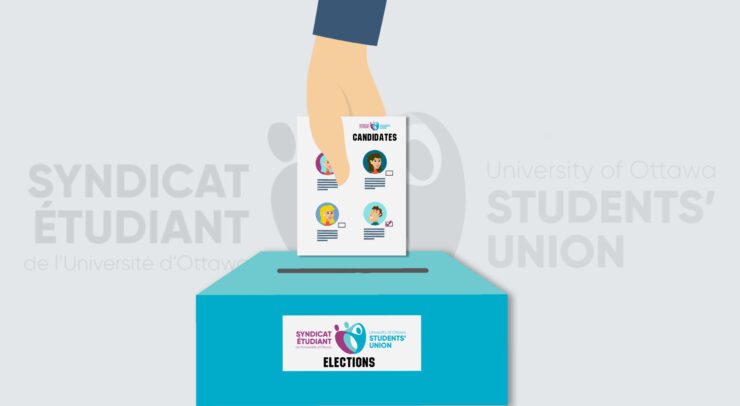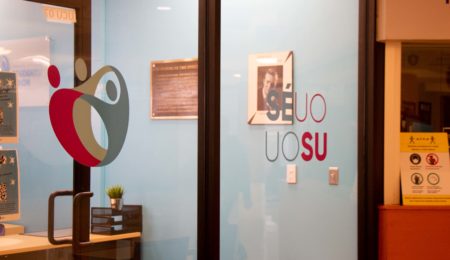UOS-Who?
I begin and end this piece by holding the following statements as true: voting is important; student governance is important; and a democratic body having the freedom to criticize its elected representatives is important.
I am fighting the urge to be defensive as I tell this story. It feels natural to brace myself—to pad the corners of my statements—for the criticism that often comes when the University of Ottawa Students’ Union (UOSU) faces scrutiny. Nevertheless, I am practicing the virtues of humility and honesty when I admit that voting can be hard when it comes to student governance.
Look, I know there are methods of staying up to date with student politics. There are meetings available for the public to view. There are systems in place to ensure transparency.
We’ve all received the annual swarm of name-underscore-UOSU-candidate Instagram accounts, each accompanied by their own slew of fresh-off-the-Canva-press posts.
However, when I asked my Instagram followers what they knew about UOSU the other day, the responses revealed a truth I suspected: most people don’t know much at all, if anything.
Mia Trinh, a fourth-year student in the French political science and juris doctor (J.D) program, says that, despite her three years here, she knows “nothing” and feels “like they’re useless.”
Vanessa Hagan, a fourth-year student in the French-to-English translation program, echoes Trinh’s lack of comprehension.
“They supposedly advocate for students and protest things that aren’t great for the student body (i.e., tuition hikes). I do know that their countless emails are annoying as hell and look/read like scam emails, lowkey,” stated Hagan.
“I honestly don’t see the point in voting for the [executives] since I need to know who/what I’m voting for, and UOSU doesn’t really make it obvious who their candidates are, besides giving out their names. How can I judge someone’s ability to run a union without knowing anything about their personal values or goals for the school?”
What’s worse is that many people are afraid to admit to this lack of knowledge — including myself. Many people are reticent to have their name associated with criticism of UOSU — also including myself.
Read it and weep: the statistics would have it that the only people who didn’t express a lack of knowledge were UOSU members.
Lukas Redmond is a fourth-year political science and public administration student, as well as deputy clubs and services commissioner with UOSU. He claims he knows “too much it hurts.” Hannah Avril Wiedrick is a fifth-year honours psychology student and former Arts director for the union’s board of directors. She, like Redmond, knows “literally so much.”
Redmond, however, acknowledges the gap in communication.
“UOSU’s executive team is replacing the clubs and services commissioner with a communications commissioner. I, along with the executive and management team, wrote a report on the need for one at the June board meeting and it was officially motioned at the July 23rd meeting. I and the rest of UOSU want to show that we recognize our communication sucks and that it’s a priority for this year and years to come.”
While that statement acknowledges room for growth in their communication, I believe there are two larger issues unaddressed still.
The first issue is rooted in Redmond’s statement itself, though it is but one example of it. This statement, like UOSU itself, is saturated in bureaucracy. Most people don’t know what commissioners there are, let alone that there was a change. They don’t attend meetings because they don’t appeal to them, and many can’t even begin to understand it. They don’t know who Robert is, nor why UOSU insists we follow his rules.
While there is value to order and systems, there is value, too, to being accessible to the very population you represent — and that is a population that is larger than the political science student community. That is not to say that only political science students know or like Robert’s Rules — some hate it. That ‘some’ definitely includes me.
Something needs to be done to make the work of UOSU easily digestible and engaging. If you ask me, this commitment to bureaucracy belongs amongst the aspiring career politicians of Model Parliament Simulation Parlementaire (MPSP), not UOSU.
The second issue is how intimidating UOSU can be — especially when it comes to voicing a complaint.
Largely in life, it can be daunting to admit that you don’t know something; that you don’t like something. It is even more daunting to do so in a student publication you know UOSU members might read.
So, it came as no surprise that many people who expressed feelings very similar to Trinh and Hagan weren’t comfortable being named in this piece. I was a bit afraid, too.
This begs the question: has UOSU’s communication in the past modeled an openness to constructive criticism? What can be done to remedy this, and is UOSU prepared to do so?
Again, voting is important; student governance is important; and a democratic body having the freedom to criticize their elected representatives is important.
UOSU’s general election had a 3.8 per cent turnout. It remains to be seen whether their upcoming byelection will reach double digits.





